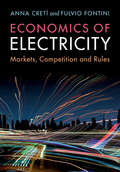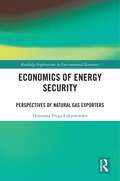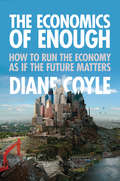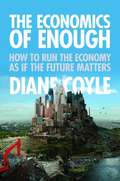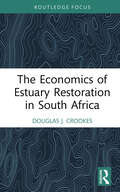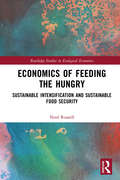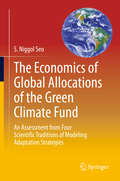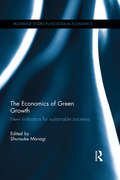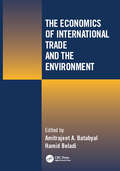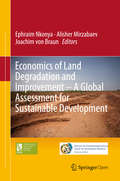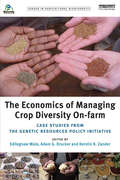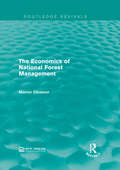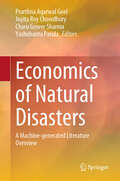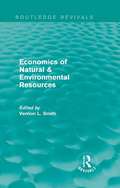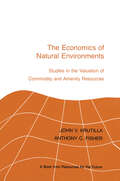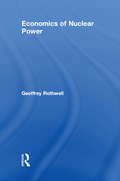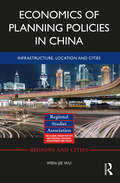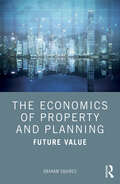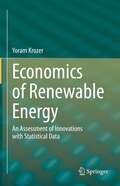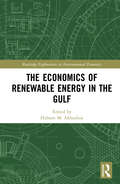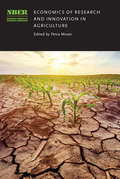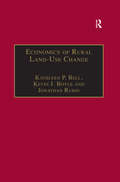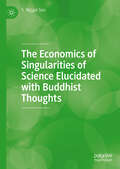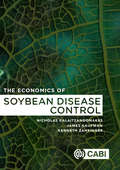- Table View
- List View
Economics of Electricity: Markets, Competition and Rules
by Anna Cretì Fulvio FontiniThis comprehensive and up-to-date book explains the economic rationale behind the production, delivery and exchange of electricity. Cretì and Fontini explain why electricity markets exist, outlining the economic principles behind the exchange and supply of power to consumers and firms. They identify the specificities of electricity, as compared to other goods, and furthermore suggest how markets should be optimally designed to produce and deliver electricity effectively and efficiently. The authors also address key issues, including how electricity can be decarbonized. Written in a technical yet accessible style, this book will appeal to readers studying power system economics and the economics of electricity, as well as those more generally interested in energy economics, including engineering and management students looking to gain an understanding of electricity market analysis.
Economics of Energy Security: Perspectives of Natural Gas Exporters (Routledge Explorations in Environmental Economics)
by Honorata Nyga-ŁukaszewskaThere has been a burgeoning interest in energy security in recent years due to the transformation of the energy landscape through deepening market deregulation, rising environmental challenges, growing energy hunger, and significant political changes. Depicting energy security as an evolving concept that absorbs economic and political conditions, this book adopts an economic approach to energy security in the international gas market. Uniquely, the book explores the theoretical assumptions and practical consequences attached to both demand and supply-side security in global energy markets. It investigates why energy exporters are so protective of independence in energy exports. The book also looks at the critically important issue of environmental aspects of energy security, particularly around climate change. It also analyses the potential for a cartel in the international gas market, similarly to the oil industry. This book will be of much interest to readers in energy economics, energy security, energy policy, IR/security studies, and relevant policy-makers.
The Economics of Enough: How to Run the Economy as If the Future Matters
by Diane CoyleThe world's leading economies are facing not just one but many crises. The financial meltdown may not be over, climate change threatens major global disruption, economic inequality has reached extremes not seen for a century, and government and business are widely distrusted. At the same time, many people regret the consumerism and social corrosion of modern life. What these crises have in common, Diane Coyle argues, is a reckless disregard for the future--especially in the way the economy is run. How can we achieve the financial growth we need today without sacrificing a decent future for our children, our societies, and our planet? How can we realize what Coyle calls "the Economics of Enough"? Running the economy for tomorrow as well as today will require a wide range of policy changes. The top priority must be ensuring that we get a true picture of long-term economic prospects, with the development of official statistics on national wealth in its broadest sense, including natural and human resources. Saving and investment will need to be encouraged over current consumption. Above all, governments will need to engage citizens in a process of debate about the difficult choices that lie ahead and rebuild a shared commitment to the future of our societies. Creating a sustainable economy--having enough to be happy without cheating the future--won't be easy. But The Economics of Enough starts a profoundly important conversation about how we can begin--and the first steps we need to take.
The Economics of Enough: How to Run the Economy As If the Future Matters
by Diane CoyleThe world's leading economies are facing not just one but many crises. The financial meltdown may not be over, climate change threatens major global disruption, economic inequality has reached extremes not seen for a century, and government and business are widely distrusted. At the same time, many people regret the consumerism and social corrosion of modern life. What these crises have in common, Diane Coyle argues, is a reckless disregard for the future--especially in the way the economy is run. How can we achieve the financial growth we need today without sacrificing a decent future for our children, our societies, and our planet? How can we realize what Coyle calls "the economics of enough"? Running the economy for tomorrow as well as today will require a wide range of policy changes. The top priority must be ensuring that we get a true picture of long-term economic prospects, with the development of official statistics on national wealth in its broadest sense, including natural and human resources. Saving and investment will need to be encouraged over current consumption. Above all, governments will need to engage citizens in a process of debate about the difficult choices that lie ahead and rebuild a shared commitment to the future of our societies. Creating a sustainable economy--having enough to be happy without cheating the future--won't be easy. But The Economics of Enough starts a profoundly important conversation about how we can begin--and the first steps we need to take.
The Economics of Estuary Restoration in South Africa (Routledge Focus on Environment and Sustainability)
by Douglas J. CrookesThis book examines the economic costs and benefits of the ecological restoration of estuaries, utilizing case studies from South Africa. Estuaries are important ecosystems from both an ecological and human perspective. Yet, in many parts of the world they are often degraded environments, facing threats from climate change, invasive species, fire and wastewater pollution. While the environmental benefits of restoring degraded environments are well discussed, this book specifically examines the economic benefits of doing so. It applies a cost-benefit analysis, which focuses on a range of key ecosystem services, including human health, fishing value, recreational value and property value. The book utlizes three detailed studies of the Swartkops estuary, the Great Brak estuary and the Knysna estuary in South Africa, but also draws out lessons that can be applied to coastal environments across the world. Overall, this book demonstrates that ecological restoration does pay and that the value of additional ecosystem services gained through restoration far exceeds the costs associated with this restoration process. This book will be of great interest to students and scholars of environmental management and restoration, ecological economics, ecosystem services and environmental conservation.
Economics of Feeding the Hungry: Sustainable Intensification and Sustainable Food Security (Routledge Studies in Ecological Economics)
by Noel RussellAs productivity expands to cater for population increase and shifting diets, many individuals remain hungry, whilst others suffer obesity, and significant amounts of food are wasted. Yet, this triple dilemma oversimplifies the underlying complexity. This book explores this complexity from an economics perspective, looking at the processes involved and the institutional structures that direct and constrain their interaction. After discussing alternative approaches to measuring hunger and food insecurity, this volume considers the four dimensions of food security: availability, affordability, utilization and stability. In summarising the main debates, issues and policy interventions, Russell discusses the problems of ensuring sufficient food in the face of ever-slowing growth in productivity and constraints on land and water. The problems of food affordability, the need for safety nets, and the need for poverty alleviation measures that reach excluded and disadvantaged groups is also discussed. This is alongside an exploration of issues related to food utilization and the problems of hidden hunger, obesity, food waste, and the interventions needed to relieve these problems. This volume is of great interest to those who study rural development, ecological economics and development economics, as well as policy makers who seek a better understanding of underlying processes, ongoing and emerging issues, and potentially relevant interventions.
The Economics of Global Allocations of the Green Climate Fund: An Assessment from Four Scientific Traditions of Modeling Adaptation Strategies
by S. Niggol SeoThis book provides an incisive and economic assessment of the global warming adaptation policy and programs carved out by the United Nations Framework Convention on Climate Change, the Green Climate Fund (GCF), by relying on the four scientific traditions that have been advanced on the economics of adaptation to climate change in agricultural and natural resource enterprises. Substantially expanding and refocusing on the book Micro-behavioral Economics of Global Warming: Modeling Adaptation Strategies in Agricultural and Natural Resource Enterprises published by Springer in 2015, this book elucidates the theories and summarizes the empirical results and predictions from the four traditions of adaptation modelling: a microbehavioral economic model of adaptation, an agronomic-economic modelling, a statistical model of yield/productivity changes, and an ecosystem model of climate change impacts. The four modeling traditions are freshly analyzed and applied to the assessments of the 93+ GCF-funded projects and programs through the end of 2018.
The Economics of Green Growth: New indicators for sustainable societies (Routledge Studies in Ecological Economics)
by Shunsuke ManagiThe Economics of Green Growth investigates the possibility of creating an integrated indicator covering three pillars of sustainable development: economy, society and the environment. The excessive pursuit of economic efficiency has resulted in severe environmental problems such as climate change and biodiversity loss, and societal human issues such as inequality and disparity. The book aims to change the direction of economic growth towards one which is more sustainable. It explores beyond the conventional indicator, the GDP that measures economic growth and human well-being. It also introduces new indicators relevant to sustainable development and a green economy and discusses the key issues for these indicators.
The Economics of International Trade and the Environment
by Amitrajeet A. Batabyal Hamid BeladiIssues related to environmental protection and trade liberalization have moved to the forefront of international policy agendas. The Economics of International Trade and the Environment explores - from an economic standpoint - many of the questions that are germane in increasing our knowledge of environmental policy in the presence of international
Economics of Land Degradation and Improvement - A Global Assessment for Sustainable Development
by Joachim Braun Ephraim Nkonya Alisher MirzabaevThis volume deals with land degradation, which is occurring in almost all terrestrial biomes and agro-ecologies, in both low and high income countries and is stretching to about 30% of the total global land area. About three billion people reside in these degraded lands. However, the impact of land degradation is especially severe on livelihoods of the poor who heavily depend on natural resources. The annual global cost of land degradation due to land use and cover change (LUCC) and lower cropland and rangeland productivity is estimated to be about 300 billion USD. Sub-Saharan Africa (SSA) accounts for the largest share (22%) of the total global cost of land degradation. Only about 38% of the cost of land degradation due to LUCC - which accounts for 78% of the US$300 billion loss - is borne by land users and the remaining share (62%) is borne by consumers of ecosystem services off the farm. The results in this volume indicate that reversing land degradation trends makes both economic sense, and has multiple social and environmental benefits. On average, one US dollar investment into restoration of degraded land returns five US dollars. The findings of the country case studies call for increased investments into the rehabilitation and restoration of degraded lands, including through such institutional and policy measures as strengthening community participation for sustainable land management, enhancing government effectiveness and rule of law, improving access to markets and rural services, and securing land tenure. The assessment in this volume has been conducted at a time when there is an elevated interest in private land investments and when global efforts to achieve sustainable development objectives have intensified. In this regard, the results of this volume can contribute significantly to the ongoing policy debate and efforts to design strategies for achieving sustainable development goals and related efforts to address land degradation and halt biodiversity loss.
The Economics of Managing Crop Diversity On-farm: Case studies from the Genetic Resources Policy Initiative
by Edilegnaw WaleThe purpose of this book is to assess a variety of economic issues as they relate to agro-biodiversity and show how addressing these issues can assist in agro-biodiversity policy-making. This is illustrated using empirical data from some of the countries (Ethiopia, Nepal and Zambia) which are part of the Genetic Resources Policy Initiative. The empirical chapters apply the relevant economic methods, including regression analysis, choice experiments, hedonic pricing, contingent valuation and farm business income analysis. The authors discuss the economics of managing crop diversity on-farm in the context of crop variety attribute preferences, farmers' perception of agro-biodiversity loss, and value addition and marketing of the products of traditional crop varieties. The case studies include detailed analysis of traditional varieties of groundnut, maize, rice, sorghum, and teff. The results are relevant not only to GRPI countries but also to other countries concerned with the sustainable utilization of these resources. Overall, the studies illustrate how genetic resources issues can be integrated into rural development interventions.
The Economics of National Forest Management (Routledge Revivals)
by Marion ClawsonOriginally published in 1976, this title concentrates upon the management of national forests. Using the best data available, Marion Clawson considers all outputs of the national forests and all costs of national forest management to analyse forests from an economics perspective. The Economics of National Forest Management is ideal for policy makers, professional foresters, and students interested in environmental studies.
Economics of Natural Disasters: A Machine-generated Literature Overview
by Prarthna Agarwal Goel Joyita Roy Chowdhury Charu Grover Sharma Yashobanta ParidaThis book is a machine-generated literature overview that explores the theoretical and empirical aspects of economics of natural disasters such as floods, cyclones, droughts, and earthquakes from a policy perspective. It provides a comprehensive collection of economic theories in Disasters and empirical findings that would benefit scholars in academia and policy-making. On the theory side, there is a growing use of game theory, Input-Output, computable general equilibrium models, and Catastrophe models to analyze the economic impacts of natural disasters. These models provide optimal decisions for the government concerning disaster relief. On the empirical front, studies showing causal and associative relationships between disasters and socio-economic variables are important for estimating disaster-related losses and making appropriate policy suggestions.The book explores different critical aspects and interlinkages of natural disasters; economic, social, and political. Besides having localized effects, disasters influence macroeconomic parameters, such as impacts on international trade and foreign direct investment. Moreover, the effects of disasters are subject to interventions from various national and international agencies. It discusses fiscal pressures caused due to disasters and existing policies related to disaster-risk mitigation and management as a guide to policy-making. It is an important guide to researchers and policymakers examining the socio-economic impact of natural disasters and public investment for disaster-risk mitigation.
Economics of Natural & Environmental Resources (Routledge Revivals)
by Vernon L. SmithFirst written in 1977, Economics of Natural and Environmental Resources presents a collection of articles written in exploration of the economic, social, and ecological problems peculiar to natural and environmental resources. Whilst focusing on the economic theory of natural resources, the contributions also consider geological, technological, and institutional features of particular resources. Policy implications and considerations are central to the text and although the book was published over thirty years ago, the issues discussed remain relevant to today’s society.
The Economics of Natural Environments: Studies in the Valuation of Commodity and Amenity Resources, revised edition
by John V. Krutilla Anthony C. FisherIn this pioneering study, Krutilla and Fisher put the amenity resources of natural environments into an analytical framework comparable to that for the extractive resources. The models and theoretical background of their techniques are illustrated by case studies which include the controversial Hells Canyon dam, the Mineral King ski resort, and the Trans-Alaska pipeline. The authors point out that resource development activities undertaken on public lands often receive financial advantages---preferential tax treatment, subsidized capital, and access to public resources---that are not taken into account in the costs of the project. True evaluation of the costs and benefits of a development project often tips the balance in favor of preserving an area in a natural state.
Economics of Nuclear Power
by Geoffrey RothwellThis book is a unique introduction to the economic costs of nuclear power. It examines the future of the nuclear power industry and unpacks the complicated relationships between its technical, economic and political variables. It does so by modelling the costs, risks and uncertainties of one of the world’s most opaque industries using micro-econometrics, econometrics, and cost engineering. Economics of Nuclear Power examines the very important costs of externalities (storing of nuclear waste and the impact of a Chernobyl or Fukushima event) and compares those to the externalities of alternative carbon based energies (oil, coal, natural gas). With over 100 tables and figures this book details nuclear power production around the world - present and planned, providing a completely global focus. It also includes an overview of the past 70 years of international nuclear power developments. This book is essential reading for students, scholars and professionals interested in energy economics, nuclear engineering and energy policy.
Economics of Planning Policies in China: Infrastructure, Location and Cities (Regions and Cities)
by Wen-jie WuFast urbanizing countries like China have experienced rapid – albeit geographically uneven – local and regional economic growth during the past few decades. Notwithstanding this development pattern, China has been investing heavily in targeted coastal and inland regions through planning policies for infrastructure, location and cities. This is a largely place-based investment process that is of great importance for the public, business and policymakers. China’s urban and regional transformations provide incentives for spatial agglomeration and will shift the growth of activities within and across cities for decades to come. This spatial differentiation is likely to be driven by government decisions at all levels about where, when and in what to invest, in an institutional context where policy instruments act to constrain or facilitate China’s urban and regional development. Economics of Planning Policies in China looks at the role that the institutional characteristics of the Chinese planning system and market mechanisms play in transforming and shaping the infrastructure, location and cities with the potential for spatial disparity and inclusive growth. The planning and geographical perspective and evidence make this book a reference for international scholars, policymakers and graduates
The Economics of Property and Planning: Future Value
by Graham SquiresThis book introduces the interlocking disciplines of property and planning to economic theory and practice. Unlike any other available textbook, The Economics of Property and Planning skilfully introduces the reader to the interplay between property and planning using an economic lens. As resources become scarce, there is a growing need for students to understand the principles of economics in property and planning, especially given the rapid social, environmental, technological, and political changes that are shaping places. The book begins with an outline of key economists and economic problems, then resources and scarcity, before examining macro- and microeconomic factors at play in property and planning. Furthermore, this book covers a variety of topics, including spatial and locational modelling, fiscal approaches to redistribution, regeneration and renewal, and transport and infrastructure financing. There is also a particular focus on contemporary issues such as climate change, environmental limits to economic growth, sustainability and resilience, and affordable housing. This book also introduces practical evaluation tools and appraisal, plus a look at property and planning with respect to macroeconomic objectives, policy, and new directions. With property and planning essential factors in economic thinking and doing, this book provides insight into what future places will look like in real terms and how they will be shaped by policy. Targeted disciplines for this book include Economics, Planning, Property, Construction, Geography, Environmental Management, Sustainability, Housing, Built Environment, Land Economy, Urban Studies, Regional Studies, and Public Policy.
Economics of Renewable Energy: An Assessment of Innovations with Statistical Data
by Yoram KrozerThe book provides a comprehensive review of renewable energy from an economic perspective throughout the last two hundred years, starting from traditional renewable energy based on bio and hydro energy. The focus is on modern renewable energy based on geothermal, wind, and solar energy. It emerged when innovative entrepreneurs captured opportunities for valuable energy services. As the services with renewable energy expanded, the costs of technologies decreased entailing global commercialisation. This enables larger access to energy and emission reduction of carbon dioxide, but also causes larger differences in the energy resources across countries which impedes international policies. That optimistic viewpoint on the shift to the global low-carbon economy is largely based on statistical data about purchasing power, energy consumption and businesses, and valuable energy services in many countries on all continents. The data are presented in 70 tables, graphs, and figures, most of them original. Interpretation of the data are useful in support of decisions making about sustainable development in civil society, businesses, and policy makers as well as for the verifications of scholarly hypotheses and projections in energy and climate policies.
The Economics of Renewable Energy in the Gulf (Routledge Explorations in Environmental Economics)
by Hisham M. AkhonbayThe Cooperation Council for the Arab States of the Gulf (GCC) has been at the epicenter of global energy markets because of its substantial endowment of hydrocarbons. Yet countries in the region have also stated their intent to be global leaders in renewable energy. This collection explores the drivers for the widespread adoption of renewable energy around the GCC, the need for renewable energy and the policy-economic factors that can create success. All six countries within the GCC have plans to include renewable energy power generation in their energy mix for various reasons including: a growing demand for electricity because of increasing populations, an increasing government fiscal deficit due to inefficient subsidies, the need to diversify the economy and global pressure to meet climate change requirements. However, the decision of when and by how much to introduce renewable energy is fraught with complications. In this book, a stellar cast of regional policy and academic experts explore the reasons behind these renewable energy plans and the potential impediments to success, whether it be the declining cost of producing energy from hydrocarbons, an infrastructure which needs to be updated, social acceptance, lack of financing and even harsh weather. Weighing up all these factors, the book considers the route forward for renewable energy in the Gulf region. The Economics of Renewable Energy in the Gulf offers an excellent examination of the adoption of renewable energy in the area. It will be of great interest to academic researchers and policy makers alike, particularly those working in the areas of energy economics, public policy and international relations.
Economics of Research and Innovation in Agriculture (National Bureau of Economic Research Conference Report)
by Petra MoserFeeding the world’s growing population is a critical policy challenge for the twenty-first century. With constraints on water, arable land, and other natural resources, agricultural innovation is a promising path to meeting the nutrient needs for future generations. At the same time, potential increases in the variability of the world’s climate may intensify the need for developing new crops that can tolerate extreme weather. Despite the key role for scientific breakthroughs, there is an active discussion on the returns to public and private spending in agricultural R&D, and many of the world’s wealthier countries have scaled back the share of GDP that they devote to agricultural R&D. Dwindling public support leaves universities, which historically have been a major source of agricultural innovation, increasingly dependent on industry funding, with uncertain effects on the nature and direction of agricultural research. All of these factors create an urgent need for systematic empirical evidence on the forces that drive research and innovation in agriculture. This book aims to provide such evidence through economic analyses of the sources of agricultural innovation, the challenges of measuring agricultural productivity, the role of universities and their interactions with industry, and emerging mechanisms that can fund agricultural R&D.
Economics of Research and Innovation in Agriculture (National Bureau of Economic Research Conference Report)
by Petra MoserFeeding the world’s growing population is a critical policy challenge for the twenty-first century. With constraints on water, arable land, and other natural resources, agricultural innovation is a promising path to meeting the nutrient needs for future generations. At the same time, potential increases in the variability of the world’s climate may intensify the need for developing new crops that can tolerate extreme weather. Despite the key role for scientific breakthroughs, there is an active discussion on the returns to public and private spending in agricultural R&D, and many of the world’s wealthier countries have scaled back the share of GDP that they devote to agricultural R&D. Dwindling public support leaves universities, which historically have been a major source of agricultural innovation, increasingly dependent on industry funding, with uncertain effects on the nature and direction of agricultural research. All of these factors create an urgent need for systematic empirical evidence on the forces that drive research and innovation in agriculture. This book aims to provide such evidence through economic analyses of the sources of agricultural innovation, the challenges of measuring agricultural productivity, the role of universities and their interactions with industry, and emerging mechanisms that can fund agricultural R&D.
Economics of Rural Land-Use Change (Ashgate Studies in Environmental and Natural Resource Economics)
by Kevin J. BoylePublic concern over land management has never been greater. This book provides a broad overview of the economics of rural land-use change, drawing attention to the meaningful role economic analysis can play in resolving public concern and supporting future, pro-active land management strategies in rural areas. The book's breadth distinguishes it from other recent texts, as it jointly offers rigorous treatments of theoretical and empirical models of rural land-use change and practical discussions of applications and relevant methods. Chapters are specifically designed to demonstrate the types of land-use questions economic analysis can answer, the types of methods that might be employed to answer these questions, and the types of public policy decisions that may be supported by such analysis. The book makes a significant contribution to contemporary land-use research, highlighting the key methodological and public policy issues that will be central to future research on the economics of rural land-use change.
The Economics of Singularities of Science Elucidated with Buddhist Thoughts
by S. Niggol SeoThis book analyses the unprecedented economic and social challenges to human civilization from the perspective of Buddhist philosophy. It reviews singularities in a broad range of scientific experiments, including the theory of relativity, quantum physics, artificial intelligence, mRNA virology, stem cell biology, and neuroscience to evaluate catastrophic risks posed to the present global economic and environmental order. Through placing these discussions within the context of Buddhist philosophy, an alternative to traditional economic and science ideas is presented. The power of technological progress and associate risks is highlighted as a way of looking into and creating a more sustainable future. This book provides a fresh interpretation of fat-tail economics that draws ideas from the basic sciences. The book will be of much value to students and researchers who are keen to environmental economics, planetwide catastrophes, and Buddhist philosophy.
The Economics of Soybean Disease Control
by Nicholas Kalaitzandonakes James Kaufman Kenneth ZahringerWorldwide soybean crop yields can achieve USD$130 billion per year in farm-level sales, but around 13% of these yields are lost to disease. Effective disease management could generate significant economic benefits, and while disease management strategies do exist, their application remains limited among producers, often due to an incomplete understanding of disease incidence and severity, as well as perceived complexities of these strategies and a lack of information regarding success rates. This book presents an economic perspective on disease control, with an emphasis on producer choice among alternative technologies and potential changes in cropping systems. It provides an overview of global soybean diseases, their economic significance and management, and covers farm-level decision making, economic payoffs of alternative disease practices and key uncertainties. The book also outlines a global economic model that evaluates disease distribution and management implications. Key features include: - Extensive empirical case studies of soybean disease control, offering strategies for economically optimal management of diseases such as soybean seedling disease and root rot. - Analysis of economic factors to guide farm-level decision making. - Consideration of new technologies in disease management and their potential market-level impacts. This text is recommended for students and researchers in plant pathology and agricultural economics, as well as professionals in the soybean production industry.
